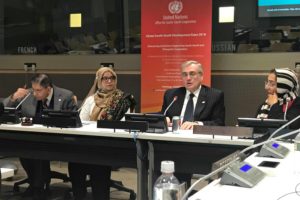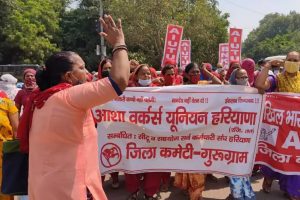[[{“type”:”media”,”view_mode”:”media_large”,”fid”:”403″,”attributes”:{“alt”:””,”class”:”media-image”,”height”:”273″,”typeof”:”foaf:Image”,”width”:”237″}}]]
Full Text:
People of the World, Surge Forward for Climate Justice!
November 1, 2014
On the first year of Typhoon Haiyan
Download a copy of the statement here.
It has been a year since Typhoon Haiyan struck central Philippines: one of the strongest and deadliest tropical cyclones ever recorded, leaving tens of thousands of people dead and missing, millions homeless and livelihoods destroyed.
In commemoration of the first year of Typhoon Haiyan and to honor all the victims of the global climate crisis, we declare this day, November 8, as International Day for Climate-Affected Communities as we call on all climate-impacted communities and their organizations to unite in demanding justice and system change.
The sufferings of the communities hit by Typhoon Haiyan are also true in countless other places around the world. Globally, the number of reported weather-related disasters has more than tripled since the 1960s. Every year, these disasters result in over 60,000 deaths, mainly in underdeveloped countries. Direct economic losses (averaging US$100 billion per annum in the last decade) in relation to GDP were more than double in low-income countries in contrast with high-income countries. On average, 250 million people are affected annually, up by more than 30 per cent in just a decade as a result of climate change. Women suffer the most in morbidity (up to 14 times more), the long-term loss of livelihoods, forced migration, climate related conflicts, and yet have the least influence over climate policies at local and international levels.
The Carteret Islands of Papua New Guinea are literally sinking, with king tides washing away crops and rising sea levels poisoning those that remain with salt. Indigenous population have been forced to flee and relocate, making them the world’s first climate refugees.
In Central America, as in many places in the Global South, warming climates have resulted in reduced yields, increases in pests and plant diseases, and losses in livestock. The same is true in a number of countries in Africa, like Kenya where perennial drought has decimated most of the livestock and crops of small-scale farmers and pastoral communities. This is catastrophic for regions where millions of people heavily depend on agriculture for their food and incomes.
In the South Asian region, frequent and more intense rainfall is destroying lives and livelihood. In Pakistan, frequent and intense weather patterns are destroying harvests, particularly in South Punjab and Sindh provinces which provide much of the wheat and rice supply for the whole country. In June 2013 in Uttarakhand, India more than 5700 people were reportedly killed by flashfloods and landslides. This year, the state of Jammu and Kashmir witnessed intense rainfall 400 times the average rainfall.
This madness is the direct result of the global capitalist system that is predicated on unending growth in extraction, production, consumption and waste for unending growth in profits. A tiny fraction of the world’s population benefit from this system — the richest one per cent of people now own nearly half of all global wealth. Developed economies, accounting for 15% of the global population use about half of the global resources and contribute the most in terms of environmental degradation.
The climate crisis is capitalism transgressing planetary boundaries. The globalization of production has inflated the profit margins for TNCs based in the global north but also increased global warming pollution of industries, agriculture, transportation and services while intensifying the exploitation of working people. Transnational companies scour the world for resources such as oil, gas, metals, and minerals. Mining and energy companies, agri-plantations and other big business interests are grabbing vast tracts of lands throughout the world, most often displacing indigenous peoples from their territories. The end result is a more rapacious and global exploitation of nature and the deepening of inequalities in wealth and power.
We realize the extent of this injustice as neoliberalism further undermines the capacity of countries in the frontlines of climate change from responding to its devastating effects. Public and social infrastructures have been neglected or even dismantled as a result of privatization and austerity policies imposed on developing countries by international financial institutions. Millions are denied basic services such as health, water and sanitation — which have been transferred into the hands of profit-driven private sector. Deregulation, implemented to entice the private sector, has led to the deterioration of living conditions – both social and environmental. As climate change amplifies the number and severity of natural disasters, so does the suffering born by the poor as the root causes of vulnerability turn natural occurrences into chronic disasters and hamper swift recovery.
And like vultures feasting on the remains of the dead, big business in connivance with governments and authorities have even devised ways to skim off profits out of peoples’ tragedies. There are numerous instances of disaster areas being converted to “investment zones” for private-public partnerships between big foreign and local businesses, often dispossessing already displaced communities.
The poor people of climate-impacted communities have no option but to try and pick up the pieces of their lives after each disaster. Amidst their governments’ inefficiency, corruption, and utter disregard for their plight, they build solidarity to protect each other during calamities, share resources, and mitigate sufferings.
We demand an end to policies and programs that violate the integrity of nature, plunder the environment, and expose already vulnerable communities to further sufferings and miseries.
We reject false solutions to the climate crisis such as the corporate “Green Economy” and profit-oriented schemes like carbon trading and offsets, payments-for ecosystem-services, large-scale biofuel production, geo-engineering schemes, corporate-controlled renewable energy, the liberalization of environmental goods and services, and other measures being peddled by some global institutions, Northern governments and corporations. These measures and policies are but attempts to greenwash capitalism, commodify nature’s life-giving and life-sustaining capacities, and further concentrate resources in the hands of the elites and their big corporations.
The advanced capitalist countries have the historical responsibility to undertake more ambitious climate actions for having contributed most to global warming. These countries must commit to quantifiable goals that will keep 80% of known fossil fuel reserves to remain in the ground and ensure that the concentration of greenhouse gases in the atmosphere return to 300 ppm. They must provide the means to prevent, minimize, and deal with damages arising from their cumulative pollution of the atmosphere as part of their ecological debt to peoples in the global south. They must also bear the costs of transferring technology to developing countries necessary to mitigate climate change.
These demands must be reflected in a binding agreement among governments currently negotiating a new climate agreement and a new development agenda to be concluded in 2015. A new international mechanism to address loss and damage associated with the impacts of climate change in developing countries should be adopted to provide adequate and non-debt creating financing for loss and damage, including compensation funds, debt cancellation, universal social protection schemes, and community-led gender-responsive adaptation and mitigation programs. There must be full and effective participation of affected communities, including women, in all levels of decision making for addressing climate change.
But most importantly, we must collectively struggle against the current system which is the main cause of the looming environmental disaster. It is clear that the basic driving force of capitalism – that is to expand, grow and accumulate more profit for the few – is in contradiction with the reality of the earth’s finite and (shrinking) natural resources. We need to found an alternative sustainable system that must ensure the basic material and non-material needs of all peoples, while protecting the wellbeing and balance of the biosphere.
As we mark the anniversary of Typhoon Haiyan and honor the memories of our families, relatives and friends, we resolve to continue to build people’s resilience against climate change through solidarity. We vow to fight for climate justice, and build a new system based on the rational, collective, and democratic management and use of resources in the interest of the people and the well-being of the planet. ###
Initial signatories:
People Surge, Philippines | Campaign for People’s Goals for Sustainable Development (People’s Goals) | IBON International | People’s Movement on Climate Change (PMCC) | Asia Pacific Forum on Women, Law and Development (APWLD) | Kalikasan – People’s Network for the Environment, Philippines | WALHI – Friends of the Earth, Indonesia | Centre for Community Economics and Development Consultants Society (CECOEDECON), India | Public Advocacy Initiatives for Rights and Values in India (PAIRVI), India | Tamil Nadu Womens Forum, India | Coastal Development Partnership (CDP), Bangladesh | People’s Coalition on Food Sovereignty (PCFS) | Pesticide Action Network Asia Pacific (PAN-AP) | Roots for Equity, Pakistan | Associación Raxcho’ch’ Oxlaju AJ (AROAJ), Guatemala | Movement for the Survival of the Ogoni People (MOSOP), Nigeria | Ethiopian Consumer Society, Ethiopia | Third World Health Aid, Belgium | People’s Health Movement | Solidagro, Belgium | Society for Rural Education and Development, India | Indigenous Peoples Movement for Self Determination and Liberation (IPMSDL), Philippines | Asia Indigenous Peoples Network on Extractive Industries and Energy (AIPNEE) | Jaringan Orang Asal SeMalaysia (JOAS), Malaysia | Kapaeeng Foundation, Bangladesh | Papora Indigenous Development Association, China/Taiwan | Lawyers’ Association for Human Rights of Nepalese Indigenous Peoples (LAHURNIP), Nepal | Philippine Task Force for Indigenous Peoples (TFIP), Philippines | Centre for Research and Advocacy (CRAM), Manipur | Sevalanka Foundation, Sri Lanka | Center for Development Programs in the Cordillera (CDPC), Philippines | Centre for Sustainable Community Development (S-CODE), Vietnam | Kalipunan ng Mga Katutubong Mamamayan ng Pilipinas (KAMP), Philippines | Unnayan Bikalper Nitinirdharoni Gobeshona (UBINIG), Bangladesh | International Womens Alliance (IWA) | Kilusang Magbubukid ng Pilipinas (KMP), Philippines | Asian Peasant Coalition (APC) | Cordillera People’s Alliance (CPA), Philippines | African Biodiversity Network | Ugnayan ng mga Manggagawa sa Agrikultura (UMA), Philippines | SFA-Machakos, Kenya | Rural Missionaries of the Philippines (RMP), Philippines | Mugal Indigenous Women Upliftment Institute MIWUI (Nepal) | Sustainable Development Foundation (SDF), Thailand | Solidaritas Perempuan (SP), Indonesia | National Fisheries Solidarity Movement (NAFSO), Sri Lanka
If you wish to endorse this statement, please email your name, organization and country to secretariat@peoplesgoals.org
_______________________________________________________________________
Note: This statement is reposted from the original text posted on the People's Goals website. Link: http://peoplesgoals.org/devjustice/people-of-the-world-surge-forward-for-climate-justice/




